Recherche avancée

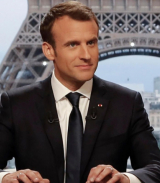 |
Sur la Syrie et Trump, le président Macron dans l’illusion de l’influence
Brèves, 16 avril, 2018
Quelques secondes dans un entretien télévisé de plus de deux heures et demie ont propulsé le président de la République à la une de la presse étrangère, comme celui qui dit avoir influencé la politique du président Trump en Syrie. A quatre reprises il y répétait que « nous l’avons convaincu » de rester militairement engagé en Syrie, et de limiter les frappes aériennes aux capacités chimiques du régime. Par ces propos publics, le président français n’a pas seulement commis une gaffe. Il a aussi, et surtout, révélé d’être tenté par une approche pour le moins naïve des relations avec les Etats-Unis, laquelle avait déjà, à d’innombrables fois, conduit les Britanniques dans l’impasse.
|
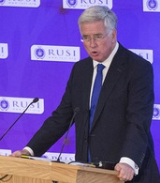 |
Les Britanniques commencent à se poser des questions sur leur relation spéciale avec l'Amérique
Note IVERIS
11 déc, 2016
Illustration parfaite d’un alignement des planètes favorable, comme jamais jusqu’ici, à l’Europe de la défense [1], même les Britanniques commencent à s’inquiéter de leur dépendance. Dans une ambiance européenne générale où, sur le plan rhétorique au moins, les tabous de toujours sont levés les uns après les autrse (tels le concept d’autonomie stratégique, la défense collective, le noyau dur d’Etats membres, le quartier général permanent, ou l’implication de la Commission dans le secteur militaire), un tel début de prise de conscience outre-Manche ne serait pas totalement dénué d’intérêt.
|
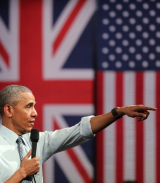 |
Brexit : un coup de poignard dans le dos des Etats-Unis
Note IVERIS
02 juil, 2016
Au lendemain du référendum britannique, le vice-président américain, Joe Biden s’est exprimé en disant : « Nous aurions préféré un résultat différent ». Quelques jours après, le Secrétaire d’Etat Kerry estime qu’il n’est toujours pas impossible de revenir en arrière. En effet, au cours des six dernières décennies, l’Amérique avait fait des pieds et des mains pour obtenir, puis perpétuer la présence de son allié préféré au sein de la construction européenne. La raison en est simple. Comme l’explique l’ambassade US à Londres, « l’Union européenne est l’organisation la plus importante du monde dans laquelle l’Amérique n’a pas de place à la table ». Pour y faire entendre sa voix, il a donc besoin d’un cheval de Troie ou, en termes diplomatiques, « l’expression dans l’UE de l’approche commune américano-britannique grâce au statut de membre du Royaume-Uni ». Sauf que les électeurs britanniques viennent d’opter pour la sortie…
|
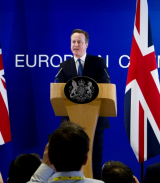 |
Le statut très spécial du Royaume-Uni
Note IVERIS
23 févr, 2016
A l’issue du sommet de l’UE des 18-19 février, destiné à trouver un arrangement qui satisfasse les exigences posées par Londres, en vue du référendum sur la sortie britannique de l’Union, le Premier ministre Cameron s’est targué d’avoir arraché un accord qui « allait donner un statut spécial » au Royaume-Uni. Au même moment, le président français a rappelé que, de par ses nombreuses exemptions, l’Angleterre « a toujours eu une place particulière en Europe ». C’est exact. Toutefois, la vraie spécificité des Britanniques à l’intérieur de l’UE aujourd’hui réside dans la prédominance idéologique de leur ligne résolument atlantiste et libre-échangiste.
|
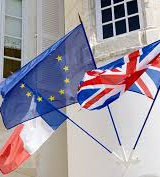 |
Au-delà de la question du Brexit
Note IVERIS
18 févr, 2016
En 1975, au moment du premier référendum britannique sur la question de savoir si l’Angleterre devait rester ou pas dans ce qui était alors les Communautés européennes, une caricature du Canard enchaîné dessina le Premier ministre Harold Wilson au lit, sur une Europa manifestement ennuyée qui l’implorait : « Entrez ou sortez, mon cher Wilson, mais cessez ce va-et-vient ridicule ». C’était il y a plus de quarante ans… Quatre décennies durant lesquelles l’Angleterre a soigneusement gardé sa position « semi-détachée de l’Europe », pour citer l’ancien Commissaire britannique, Chris Patten...
|
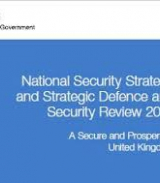 |
Londres et Washington se félicitent du nouveau Livre blanc britannique
Note IVERIS
30 nov, 2015
Selon le Premier ministre Cameron, le président Obama est « clairement ravi » et « a donné son approbation » à la nouvelle Revue stratégique et de défense du Royaume-Uni. A vrai dire, le contraire aurait surpris, vu que les Américains avaient « participé activement » à la rédaction dudit document.
|
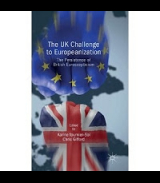 |
La dimension transatlantique de l'euroscepticisme britannique
The UK Challenge to Europeanization (ed. K. Tournier-Sol - C. Gifford)
16 sept, 2015
La dynamique des relations entre le Royaume-Uni et l’Union européenne ne peut être appréhendée dans sa totalité et dans sa spécificité sans prendre en compte le rôle déterminant qu’y jouent les Etats-Unis, à travers notamment les relations que Londres voudrait croire « spéciales ». Que ce soit de manière directe, indirecte, voire parfois paradoxale, le tropisme américain/atlantiste de l’establishment politico-médiatique britannique est en arrière-fond d’une bonne partie de leurs positions considérées comme sceptiques, ou même carrément hostiles envers de la construction européenne.
|
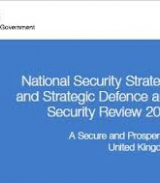 |
Le Pentagone co-auteur du prochain Livre blanc britannique
Note IVERIS
08 aout, 2015
Lors d’une conférence à la Chatham House sur l’avenir de la grande alliance navale UK-USA, le Secrétaire à la Défense britannique, Mike Fallon, a avoué publiquement que la rédaction du prochain SDR (Strategic Defence Review, une sorte de Livre blanc d’outre-Manche) se fait avec la « participation directe » du Pentagone.
|
 |
Un pour tous, tous pour un ? (Partie 2 : interrogations dans l'Alliance)
Notes d’actualité, 29 oct, 2014
Au dernier sommet de l'OTAN, la défense collective a fait un « comeback » fracassant, la crise russo-ukrainienne aidant. Certes, ce fut déjà inscrit au programme depuis deux ou trois ans. Avec la baisse sensible de l’appétit pour les exploits extérieurs (peu populaires, trop coûteux, entraînant des résultats politiques pour le moins douteux), et la nécessité de rassurer les nouveaux alliés, particulièrement angoissés après l’annonce du « pivot » américain, l’Alliance devait, de toute façon, dépoussiérer son article 5. Ce qu’elle était en train de faire. Mais rien ne vaut un petit affrontement bien pimpant avec la Russie, pour donner un coup de pouce en la matière.
|
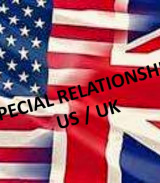 |
Petites perles de la relation (très) spéciale UK-USA
Notes d’actualité, 02 oct, 2014
Observer de près la bien-nommée relation spéciale entre la Grande-Bretagne et l’Amérique est divertissant à plusieurs titres. Outre le spectacle hallucinant de la dépendance extraordinaire dans laquelle les vaillants Britanniques se sont enfermés au fil du temps, le sujet apparaît à la fois comme une échappatoire bienvenue et comme une mise en garde édifiante.
|
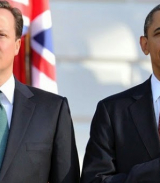 |
Vive l'Ecosse libre?
Notes d’actualité, 18 sept, 2014
Une Ecosse indépendante ? On n'en veut surtout pas, à en juger par la panique qui s’est emparée ces derniers temps des élites « occidentales ». A mesure que les indépendantistes montaient dans les sondages, certains n’ont pas été avares de pressions et de (plus ou moins) subtiles mises en garde.
|
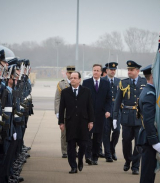 |
L’Europe de la défense, éternelle pomme de la discorde entre la France et le Royaume-Uni
Notes d’actualité, 31 janv, 2014
Au récent sommet franco-britannique, en plein milieu des annonces concernant la coopération militaire bilatérale, le président Hollande a frôlé le crime de lèse-majesté, en osant prétendre que « Le drone de combat préfigure ce que pourrait être une Europe de la défense ». Pour les Britanniques, coopérer, pourquoi pas, mais n'évoquons surtout pas l'Europe, et en particulier pas en l'associant aux questions de défense.
|
 |
Une Ecosse indépendante non-nucléaire dans l’OTAN ?
Entretien à BBC Radio l’émission 5 Live Drive
20 nov, 2013
En quoi la posture antinucléaire du SNP (Scottish National Party) devrait-elle constituer un problème pour une Ecosse indépendante mais soucieuse de garder sa carte de membre à l’OTAN ?* En pas grand-chose, pour faire bref. Le fait d’exiger le retrait des armes nucléaires UK de son territoire et de se proclamer Etat non nucléaire n’est pas a priori en contradiction avec le statut de membre de l’OTAN. Pour rappel : à présent 20 pays membres sur les 28 ne possèdent ni n’hébergent d’armes atomiques sur leur sol.
|
 |
Petites perles de la semaine écoulée (10 novembre 2013) - compilation des entrées Google+
Brèves, 10 nov, 2013
NSA/Europe
1. L'ambassade britannique à Berlin écoute les conversations des Allemands. Ajoutons juste deux précisions au sujet de la coopération des « Cinq yeux », au nom de laquelle le Royaume-Uni espionne, pour le compte des Etats-Unis, ses partenaires européens. Primo, dans le système Echelon (le réseau d’interception des communications opéré depuis des décennies par les cinq pays anglophones UK, USA, Canada, la Nouvelle Zélande et l’Australie), le monde entier est divisé en zones de responsabilité géographique. Et Londres y a la charge de surveiller l’Europe, proximité oblige.
|
 |
Lectures de la semaine (25 août 2013)
Brèves, 25 aout, 2013
Les fidèles Britanniques ont eu droit à un énième camouflet de la part de leurs « cousins » d’outre-Atlantique, cette fois-ci sous la forme d’une petite pique du porte-parole de la Maison Blanche qui a publiquement pris ses distances avec les autorités du Royaume-Uni. En affirmant, sans rire, à propos de la destruction des disques durs du journal Guardian contenant les fuites sur les programmes de surveillance UK-US (Tempora/PRISM), qu’il « est difficile d’imaginer un scénario dans lequel ce serait approprié ».
|
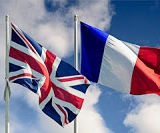 |
Identité européenne: un « malentendu » vieux de quarante ans
Notes d’actualité, 24 aout, 2013
En attendant le sommet « Défense » du décembre prochain, rappelons d’abord un seul petit mot traduit de travers il y a quarante ans, et qui est plus révélateur que des centaines de pages d’études et d’analyses pour expliquer l’impasse de l’Europe de la Défense (et, avec elle, l’impossible émancipation de notre continent).
|
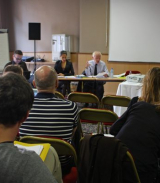 |
Sur la dimension transatlantique de l'euroscepticisme britannique
Séminaire international à l'université de Toulon
09 avril, 2013
La dynamique des relations entre le Royaume-Uni et l’Union européenne ne peut être appréhendée dans sa totalité et dans sa spécificité sans prendre en compte le rôle déterminant qu’y jouent les Etats-Unis, à travers notamment les relations que Londres voudrait croire « spéciales ». Que ce soit de manière directe, indirecte, voire parfois paradoxale, le tropisme américain/atlantiste de l’establishment politico-médiatique britannique est en arrière-fond d’une bonne partie de leurs positions considérées comme sceptiques, ou même carrément hostiles envers de la construction européenne.
|
 |
L’indépendance écossaise et la question de la sécurité transatlantique et européenne
University of Glasgow International Lecture Series
21 mars, 2013
La position particulière du Royaume-Uni dans l’espace de sécurité européenne et transatlantique constituera l’un des premiers éléments déterminants et pour l’attitude des autres Etats face à une éventuelle indépendance écossaise (voudraient-ils ou pas voir Londres s’affaiblir même si juste momentanément), et pour leur appréciation des politiques menées par une Ecosse indépendante (seront-elles en ligne, ou se différencieront-elles, et si oui, sur quels points, des politiques de Whitehall). Dans les deux cas, Londres et non pas Edinburgh sera le point de référence.
|
 |
Brèves transatlantiques de décembre 2006
La Lettre Sentinel n°43-44, janvier-février 2007
08 févr, 2007
Quelques nouvelles de l’actualité européenne et transatlantique, brièvement présentées et commentées.
|
 |
Le grand écart des Britanniques au-dessus de l'Atlantique
Népszabadság Online
05 juil, 2005
L’adhésion de l’Angleterre à la Communauté européenne marquerait le début d’une dilution au bout de laquelle « il apparaîtrait une Communauté atlantique colossale sous dépendance et direction américaines et qui aurait tôt fait d’absorber la communauté de l’Europe. » Les mots prophétiques du général De Gaulle, en 1963, ne cessent de se vérifier depuis.
|
 |
Visions et contre-visions, ou sur les contradictions fondamentales des relations transatlantiques
Külügyi Szemle 2003/4
01 déc, 2003
La crise irakienne n’a fait que révéler au grand jour les tensions structurelles des relations euro-américaines, couvées depuis des décennies et devenues plus épineuses après la fin de la période bipolaire. Outre la pseudo-vision officielle et les visions d’occasion représentées par les inconséquences allemandes, les deux grandes visions, concurrentes l’une de l’autre, sur l’Europe, les relations transatlantiques et l’ordre international sont défendues par la Grande-Bretagne et la France.
|
 |
La Grande-Bretagne et l’Euro(pe) : la non-décision
Journal Francophone de Budapest
18 juin, 2003
Fidèle aux plus profondes traditions de la politique britanniques en matière européenne, l’annonce de Gordon Brown, ministre des Finances, sur l’ajournement de la décision sur l’euro se définit, une fois de plus, par le tryptique « Oui. Non. Peut-être. ».
|
|
 |
Les plus lus


|



